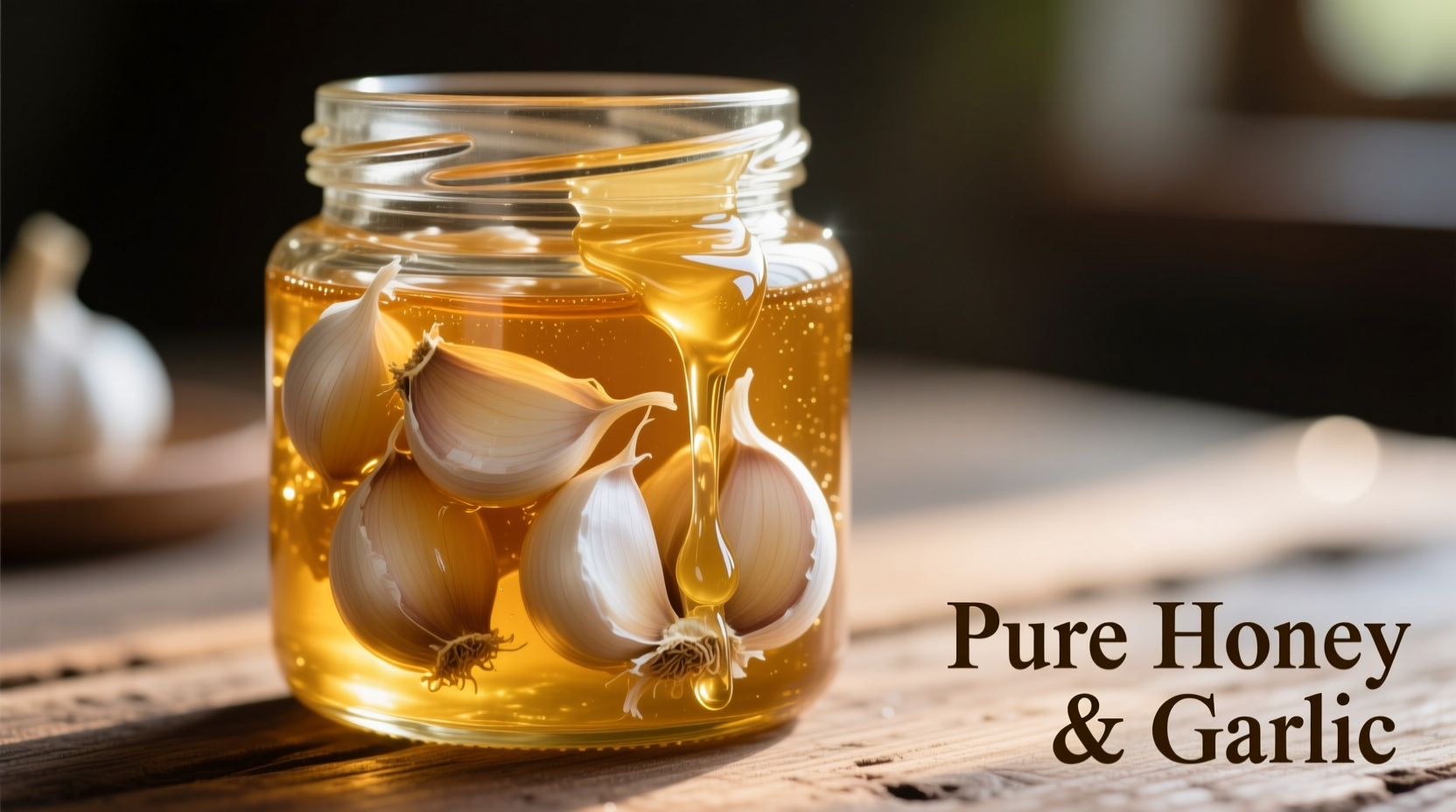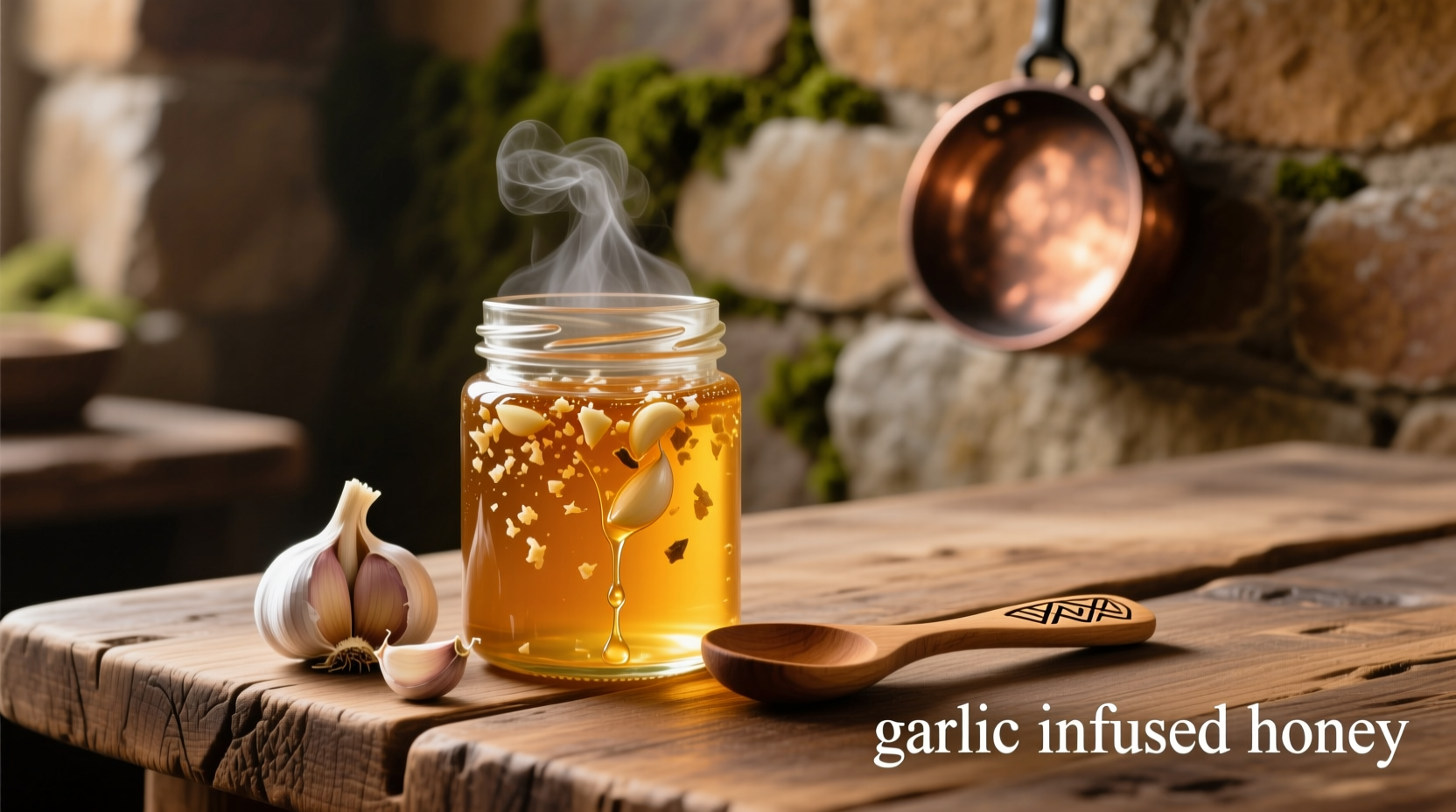Garlic infused honey combines raw honey's natural sweetness with garlic's savory depth, creating a versatile ingredient perfect for dressings, marinades, and soothing remedies. When prepared correctly using fresh ingredients and proper food safety practices, it maintains quality for 3-6 months at room temperature. This guide provides step-by-step preparation methods, culinary applications, and essential safety considerations based on culinary tradition and food science principles.
As a French-trained chef specializing in European spice traditions, I've spent years exploring how historical infusion techniques can elevate modern cooking. Garlic infused honey represents one of the most enduring flavor combinations across Mediterranean and European culinary history—a testament to how simple ingredients create extraordinary results when properly combined.
The Historical Journey of Garlic and Honey Infusions
Garlic and honey have been paired since ancient times, with evidence of their combined use dating back to Roman culinary practices. Historical records from medieval European herbals document this combination as both a culinary staple and traditional household remedy. The practice spread through monastic kitchens where monks preserved knowledge of herbal preparations.
| Era | Documented Use | Primary Region |
|---|---|---|
| Ancient Rome | Garlic-honey mixtures for soldiers' stamina | Mediterranean |
| Medieval Europe | Monastic medicinal preparations | France, Italy, Spain |
| Renaissance | Culinary flavor enhancer in sauces | France, England |
| Modern Era | Versatile ingredient in gourmet cooking | Global |
Creating Perfect Garlic Infused Honey at Home
Follow this professional technique for optimal flavor extraction without compromising food safety:
Essential Ingredients and Equipment
- 1 cup raw, unfiltered honey (locally sourced preferred)
- 4-6 fresh garlic cloves, peeled and lightly crushed
- Glass jar with airtight lid (8-ounce capacity)
- Wooden skewer for air bubble removal
Step-by-Step Preparation
- Thoroughly clean and dry your glass jar—moisture causes spoilage
- Add peeled garlic cloves to the jar, leaving 1 inch of headspace
- Pour honey over garlic until fully submerged
- Use a wooden skewer to release air bubbles trapped around garlic
- Seal tightly and store at room temperature away from direct sunlight
- Shake gently once daily for first week, then weekly thereafter

Culinary Applications That Impress
Professional chefs utilize garlic infused honey in these sophisticated applications:
Signature Sauce Base
Combine 2 tablespoons garlic infused honey with 1 tablespoon Dijon mustard, 3 tablespoons extra virgin olive oil, and fresh herbs for an exceptional salad dressing. The natural emulsifying properties create a stable vinaigrette that maintains texture better than standard preparations.
Meat Glaze Technique
Apply during the final 10 minutes of roasting chicken or pork. The sugars in honey caramelize while garlic flavor penetrates the meat surface. For optimal results, brush on in three thin layers with five-minute intervals between applications.
Artisanal Cheese Pairing
Drizzle over aged cheeses like Manchego or sharp cheddar. The sweet-savory contrast enhances complex cheese flavors while the garlic adds aromatic depth. Serve with crusty bread for an impressive appetizer that requires minimal preparation.
Storage Guidelines and Shelf Life
Properly prepared garlic infused honey maintains quality under these conditions:
- Room temperature (68-72°F): 3-6 months
- Refrigeration: Not recommended (causes crystallization)
- Signs of spoilage: Bubbling, sour smell, mold development
According to USDA food safety guidelines, the high sugar content and low moisture environment of honey naturally inhibits bacterial growth, making proper preparation essential for safety.
Critical Safety Considerations
While garlic infused honey appears simple, specific safety protocols prevent potential risks:
- Never use minced garlic—increased surface area raises botulism risk
- Avoid moisture introduction—always use dry utensils when handling
- Do not refrigerate—causes crystallization and texture deterioration
- Discard immediately if bubbling, off-odors, or mold appear
Commercial producers follow strict acidification protocols that home preparers cannot replicate. Understanding these limitations ensures safe enjoyment of this traditional preparation.
When Garlic Infused Honey Isn't Appropriate
This preparation has specific context boundaries where alternative methods work better:
- Immediate cooking needs—freshly minced garlic provides more intense flavor
- Medical applications—do not substitute for professional healthcare
- Long-term preservation—vinegar-based infusions last longer
- Raw consumption by infants—honey carries botulism risk for children under 12 months
Recognizing these limitations demonstrates culinary professionalism and ensures appropriate usage in various cooking scenarios.











 浙公网安备
33010002000092号
浙公网安备
33010002000092号 浙B2-20120091-4
浙B2-20120091-4